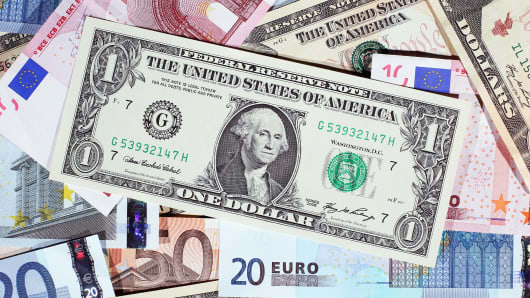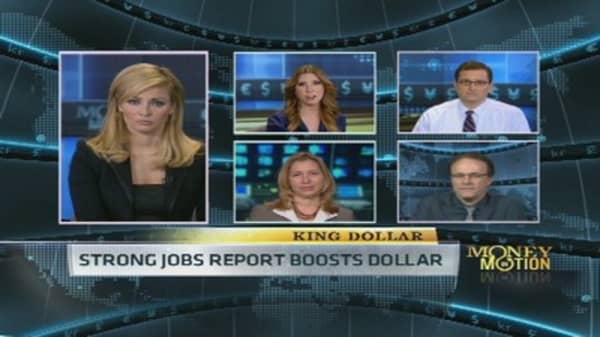Dollar weakness in recent years has been positive for stocks because it has cheapened exports and boosted the fortunes of multinational companies.
Recently, though, as concerns have become elevated about a bond bubble and the economy has displayed signs of strength, investors have channeled money towards the U.S. currency.
(Read More: Why China's Yuan Is No Longer a Big Worry for US)
Against its principal rival, the euro, the dollar has gained 4.5 percent since early February. The dollar index, which measures the greenback against a basket of foreign currencies, is about the same during that time.
Comparatively, the Standard & Poor's 500 has gained about 2.5 percent in the period while the Dow industrials are up 3 percent.
"The strong inverse correlation between the two certainly has broken down here of late," said Richard Ross, chief global strategist at Auerbach Grayson. "In the short term we see these relationships break down and reverse polarity. Ultimately you're going to see reversions to the more historical norms, or at least what we've seen over the last four years."
Since the onset of the 2008 financial crisis the weak dollar-strong stocks trade has been nearly inviolable except for a brief run in late 2011.
Investors have turned to the dollar in times of geopolitical turmoil, part of what has been known as a risk-off trade.
But during the recent run of economic strength, buoyed by Friday's nonfarm payrolls report showing 236,000 new jobs in February, investors have sought dollars as a bet on a U.S. recovery, however tepid.
(Read More: US Job Creation Surges as Rate Falls to 7.7%)
That presents a challenge for the Federal Reserve, which has been creating dollars and using them to buy government debt, and in the process keeping the currency value low.
"The U.S. economy is still fundamentally weak. The low interest rate quantitative policy will keep the dollar low, which is exactly what the Fed wants for a recovery," said Michael Yoshikami, CEO at Destination Wealth Management in Walnut Creek, Calif. "Obviously the concern is if the dollar gets stronger, global companies are going to be negatively affected in the U.S. I just don't think that will be the case."
Further strengthening in the dollar, though, would bolster the case that the market is vulnerable to a pullback.
Ross has forecast that stocks likely will lose about 5 percent in the near term and he advises investors to raise cash in preparation.
"With markets at multi-year if not all-time highs, investors should be cautious," he said. "If I owned stocks I would like to raise some cash ahead of that coming correction and put it to work at lower levels."
Monday trading saw the dollar index little changed while stocks edged higher.
"Even if the dollar strengthens I don't think it's going to be that much of a bull run," Yoshikami said. "We're continuing to remain in equities - taking profits off the table, but we're reinvesting that profit in cheaper companies."
Kinahan also likes the idea of shifting allocations, advising clients to use covered calls for protection. The strategy employs selling options that give the owner the right to buy a stock that the investor already owns.
"For the retail investors I would probably be lightening up my bond positions," he said. "What we're doing for our clients is getting into stocks but in in a smarter way."





